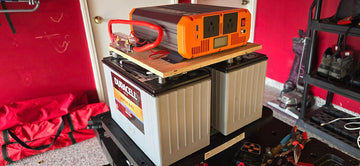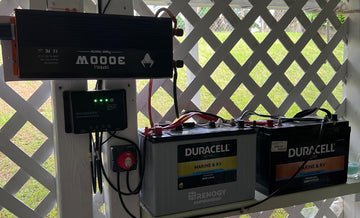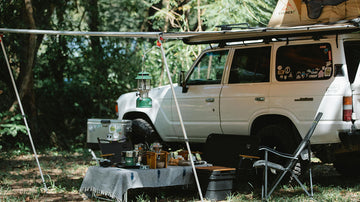A portable power station, similar to a mobile power supply, but with greater capacity and higher power output, and with an AC (wall) outlet. The portable power station provides energy convenience at your fingertips when camping in the wilderness, and it can also be used as a home backup power source during a power outage.
Components of a portable power station
Consisting of basic components such as batteries, a power converter, and a range of sockets and ports, these stations are compact and portable. How do they work with each other?

Battery Charging: Batteries in portable power stations can be charged from a variety of sources, such as plugging them into a wall outlet, connecting them to a 12V outlet in a car, or utilizing solar energy through a compatible solar panel.
Storing Energy: After charging, electrical energy is stored in the battery as chemical energy for later use. Battery capacity determines the amount of energy that can be stored and delivered by a power station and is measured in watt-hours (Wh) or amp-hours (Ah). By storing more energy, a higher-capacity battery can support more equipment or run longer.
Portable power stations primarily use lithium-ion batteries because of their high energy density, lightweight, and long cycle life. Other battery technologies, such as lead-acid or nickel-metal hydride, are also available for specific models.
Power delivery: When electronic devices need to be powered or charged, they can be connected to the appropriate outlets or ports on the power station. The power inverter converts the DC power stored in the batteries into AC power for devices plugged into AC outlets.
Tips to Maintain Portable Power Station
- Keep it clean: Avoid clogging the vents with dust, dirt, or debris that could cause the unit to overheat. Use a soft, dry cloth to wipe down exterior surfaces and clean all vents, outlets, and ports. Avoid using harsh chemicals or abrasive materials that could cause irreparable damage.
- Charge and Discharge: Charge and discharge the battery regularly to keep it healthy. Avoid allowing the battery to fully discharge for extended periods of time as this may result in a loss of capacity. Likewise, avoid overcharging the battery and keep it between 20% and 80% charged.
- Regular charging when storing: If the power station is not to be used for a long period of time, store it in a cool, dry place. Before storing, make sure the battery is fully charged, approximately 50-70% (the ideal storage level for lithium-ion batteries). It is also wise to replenish the battery every three to six months to prevent its discharge level from becoming too low and causing harmful discharges.
- Environmental Factors: Avoid exposing the station to extreme temperatures, direct sunlight, humidity or water. Extreme temperatures can have a serious impact on battery performance and life. While high temperatures may accelerate the degradation process of the battery more quickly than usual, low temperatures may temporarily reduce efficiency and thus charge capacity. Operating the station within the specified temperature range will ensure optimum performance.
- Ventilation: Ensure that the area around the power station is well ventilated, especially when using high power equipment. Obstructed or restricted airflow can lead to overheating.
- Overload protection: Avoid overloading the plant beyond its specified capacity. Excessive power demand will stress the inverter and may damage the plant.
- Cable Management: Keep cables neatly organized and avoid excessive tangling or twisting. Proper cable management reduces the risk of damage and ensures efficient power transfer.
- Firmware Updates: Some portable power supplies may have firmware that can be updated by the manufacturer. Manufacturers often release updates to this firmware to improve performance and extend battery life. Check promptly for available firmware updates and follow the instructions provided by the manufacturer to keep the power supply current.
- Periodic Inspection: It is recommended that the long-term operation of the portable power station be monitored periodically. Be aware of any sudden drops in efficiency or charging problems, as this may suggest that a potential problem exists that requires early diagnosis to ensure optimal performance and longevity. Check batteries, power converters, outlets and ports for signs of damage, loose connections or wear. If you find any problems, consult the user manual or contact the manufacturer for guidance. Performing regular inspections will prevent further damage and extend the life of the power station.
Factors to Select a Portable Power Station
When purchasing a portable power station, there are several key factors to consider:
Power requirements: Determine which devices you need to power and calculate their total power requirements. Select a power station with sufficient power output to meet your needs. Note that power requirements may vary from device to device, especially for high power devices such as power tools or electric vehicle chargers.
Capacity and battery type: Consider battery capacity, which is how much energy the power station can store. A larger capacity means the plant can support longer runs or power more devices. Also, understand the battery type; LiFePO4 (lithium iron phosphate) batteries offer excellent safety, long life and stability, but are relatively expensive. They offer higher energy density and a lighter design than traditional batteries.
Charging Options: Typically, portable power stations can be recharged from an AC outlet, car charger, or solar panel. Consider your usage environment and available charging resources to choose the charging method that fits your needs. Flexibility in charging methods (wall outlets and car chargers) is critical in emergency situations.
Output Ports: Determine if the power station has the right output ports for your equipment. Common output ports include AC outlets, DC outlets (e.g., car cigarette lighter sockets), and USB ports. Make sure the power station provides the proper number and type of output ports for connecting your equipment.
Weight and portability: Consider the weight and portability of the power station. If you need to travel or be outdoors with your power station frequently, it may be more convenient to choose a lighter and more portable model.
Safety features: Check to see if the power station has the necessary safety features, such as overload protection, short-circuit protection, and over-temperature protection. These features can protect your equipment and power station from potential risks. These protections can be very valuable.
Durability and build quality: Long-term outdoor use requires finding portable power stations that can withstand rough handling and harsh environments
Brand reputation and customer reviews: Learn about the reputation and word-of-mouth of the power station brand. Read reviews and comments from other users to find out about performance, reliability and after-sales support.
After-sales support and warranty: Find out the power station's after-sales support policy and warranty period. Ensure that the brand offers good customer support and after-sales service so that you can get help and repairs when needed.
FAQs
Q: How long will a portable power station run?
A: Portable power stations can provide anywhere from a few hours to dozens of hours of use, depending on capacity, equipment power requirements, and the impact of time of use. Before purchasing a power station, it's a good idea to review the product specifications and descriptions to get an idea of the range of hours of use it is expected to provide and select the right model for your needs.
Q: Is it worth getting a portable power station?
A: Considering whether you have a frequent need to move around or use electricity outdoors, portable power stations can serve as an emergency backup power source, allowing you to charge a wide range of devices anywhere, anytime. It offers flexible charging options including AC wall outlets, solar panels, 12V car chargers, electric vehicle charging ports and dual-fuel generator connections.
Q: Can you use a portable power station while charging?
A: Preferably not, the power station's batteries may not charge optimally, reducing the overall capacity of the battery and potentially affecting its lifespan.
Q: Can a portable power station run a refrigerator?
A: Yes, a portable power station can run a refrigerator or freezer. However, it depends on the size and capacity of the power station and the refrigerator.
Q: Which is better generator or power station?
A: This takes into account your specific power needs, intended use, convenience, environmental impact and budget. If you need a portable unit with low power output, then go for a portable power station. On the other hand, if you need a higher continuous power output, a generator is the best choice.
Q: Can a 200W power station run a TV?
A: Typically televisions consume an average of about 100W per hour with lower power consumption, especially smaller sized LCD or LED televisions. However, if you plan a power station, you will have to include all other appliances running at the same time.
View our selection of portable power stations!














